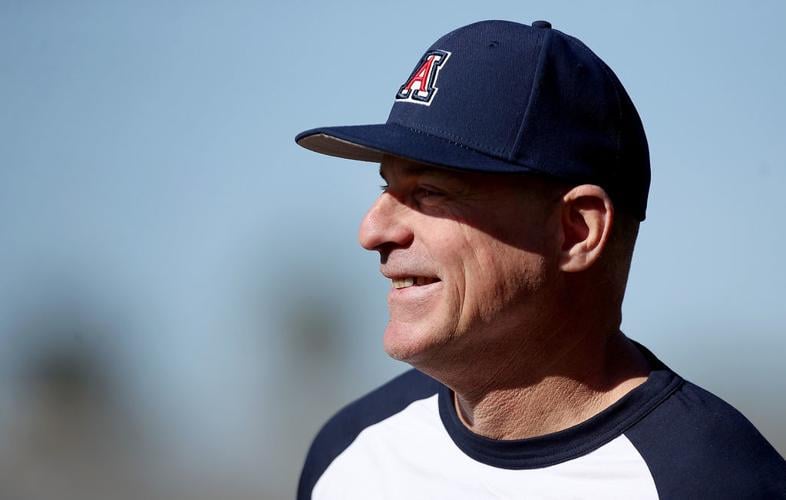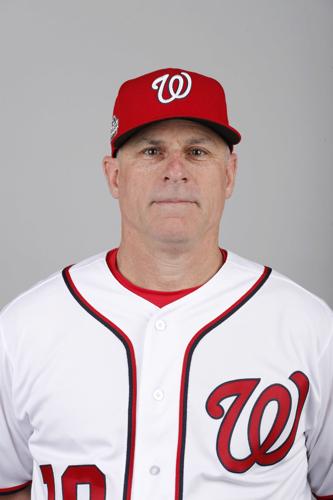NEW YORK — If Dave Martinez smiled any wider, he would’ve needed a second set of teeth.
Sitting in a cramped visiting manager’s office in Citi Field in Queens, surrounded by a horde of media, the Washington Nationals first-year manager put the Cheshire cat to shame when asked about his new bench coach, Chip Hale.
Hale, an Arizona Wildcats legend and former Tucson Sidewinders and Arizona Diamondbacks manager, left his position as Oakland A’s bench coach to impart his baseball wisdom on Martinez — even if, at 53, they are the same age.
Hale bounds with enthusiasm for the game. That, as much as anything, is what made Martinez tab Hale for the all-important position of bench coach.
“Energy!” Martinez says, excitedly, about his new hire.
Hale was brought to Martinez’s attention by Nationals general manager Mike Rizzo, who worked with Hale with the Diamondbacks. They met for breakfast, talked baseball and took an immediate liking to one another. Martinez was sold.
“He’s great to have around,” Martinez said, still grinning. “I talk to Chip daily. He’s managed the game before, helps me in making in-game decisions. He brings a lot of energy. He’s a go-getter, and I love having him around.”
Hale, who was named Pacific Coast League manager of the year in 2006 after leading the Sidewinders to a PCL championship, was similarly sold on not only the Nationals, but Martinez.
The Star caught up with Hale before Wednesday’s game against the Mets.
You’re at a stage in your career where you have some ability to pick and choose your opportunities. What was it about this one that stood out to you?
A: “It was an opportunity to come in and be with a really talented group of guys. I knew Mike Rizzo from our Diamondback days, early in the 2000s – he was the scouting director – and he’d built this team. I wanted the opportunity to get to the playoffs and have a chance to win a World Series. At this point in my career, with the options I have, this was a good one. I’m trying to learn more as a baseball person. Being around a different front office, scouting, player development — being around them in spring training was fun, just seeing how this group works. Also, quality of life. Coming back to the East Coast, seeing what it’s like in Washington, D.C., which is a great place. My wife had a major part in it, too. We had to make a decision for the family, not just for me.”
As you advance in your career, how important is it just to be in the thick of a playoff race, to be competing long into September and beyond?
A: “I wanted to get back into that scene, of being able to play for championships. When I was at Oakland last year, it was good to be there, and after the years that I managed, to take a deep breath. There is a lot of talent there, and it’s going to be a good team in the future, but this is a team (the Nationals) that is ready to win now. With good health, getting our pitching on track, it’s going to be a good year for us. It’s exciting, and it’s also a learning process. If you stop learning, you’re going to be out of the game. To learn with Davey, to be with different people, I think is important too. That was another part of the decision, and I’ve really enjoyed my time here.”
Now we know what intrigued you about Washington; what do you think it was that caught Dave’s eye about you?
A: “It’s important that you get someone who has done it before, knows what it’s like handling the press, dealing with the game and each decision. It’s been a good fit, both ways. We enjoy each other, we enjoy each other on the bench and have a good time. But he knows when it is time to work, and I like that. I think we have as good a staff you can put together in baseball.”
The bench coach position is sort of an undefined role, but a trusted confidant. How has it been building that trust and playing that role with a first-time manager?
A: “It’s developing. You can’t expect it to come right away. Spring training, he worked out what he wanted from me. During the season, we’re getting better at it. He’s been very trusting. When he got tossed (on April 7), I managed the game, and there was no one yelling from the tunnel. I know he trusts my decisions, and I’ll always give him as much information as I can, and he makes the final decision.”
Is there anything that you picked up on specifically in your time as a big-league manager that you’ve brought with you to Washington?
A: “Just being on big-league staffs, being in Oakland with Bob Melvin, being here in New York with Terry Collins and Jerry Manuel (in 2010 and 2011), was very, very important in terms of learning everything. I can’t pick one or two things that led me to this spot, or that I would’ve done differently, I just learned: It’s your decision. I was a hitter, I was a position player, and learning the pitching part — trusting the pitching coach — that’s why I think as a bench coach now, I’m able to help Dave a lot with those pitching decisions. I went through that for two years as a manager. To have seen it, which way things go.”
You used a phrase, “the final decision.” What is it like to surrender that, and transition to a role where your input is wanted, but the buck doesn’t stop with you?
A: “It’s perfect. I went through that last year with Bob (Melvin), and you just give all the information you can give him. It’s his choice, and he doesn’t just ask me. He’ll ask the pitching coach, he’ll ask other coaches, and he gets the best information he can have. Sometimes he asks me what would I do, and I’ll tell him what I’d do. It’s not a hard thing to handle, because I know he’s the one who has to answer the questions after the game.”
Speaking with Dave about you, he instantly burst into a smile and talked about your energy – what is it about this game that keeps you so excited after three decades?
A: “It’s exciting. I love watching players play. To be in the dugout and watch a guy like Bryce Harper hit, to watch a (Max) Scherzer or (Stephen) Strasburg or (Tanner) Roark, to watch how they work, it excites me. That old-school part of me has a respect for the game. When you see guys play it right, act right — that still gets me. I’ll never get away from that, even when I’m done doing this.”
Bryce Harper is one of those once-in-a-generation talents we hear about; what makes him so special?
A: “I don’t believe he’s even close to where he’s going to end up. He’s so good. But he’s young. He’s still learning. You watch him every day, and he enjoys it. He enjoys winning. It bothers him when we don’t win. That’s what I always say about the star guys. It’s one thing to be good and put up big numbers, but they just refuse to be on the losing side. That’s my favorite thing about him, the way he competes.”
With your experience playing for UA and managing the Sidewinders, would you think minor-league baseball should return to Tucson?
A: “We still live in Tucson in the offseason, I still consider myself a Tucsonan, and it would be a great place for Triple-A again. The problem is having the stadium in the right place, where fans will come. I loved managing there, we had a great time, had a great facility. It just wasn’t a place people came at night to watch games. There are opportunities to go back to places, and hopefully they get another turn at it.”





